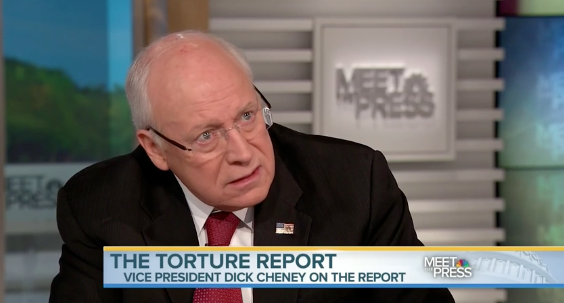The most audacious part of former US vice president Dick Cheney’s interview on Meet the Press on Sunday was not that he would ‘do it again in a minute.’ ![]()
No one doubts that Cheney (pictured above) has no doubts about the aggressive ‘enhanced interrogation’ techniques that may have amounted to torture. To me, two other moments stood out. One was when Cheney invoked the memory of the September 2001 terrorist attacks when NBC’s Chuck Todd asked him for his explicit definition of terrorism:
“Torture is what the Al Qaeda terrorists did to 3,000 Americans on 9/11,” Cheney said on NBC. “There is no comparison between that and what we did with respect to enhanced interrogation.”
It was a masterful political argument, perhaps, insofar as Cheney shifted the question from the technical definition of torture to making an emotion-based argument rooted in the instinctive fear surrounding the horrific attacks 13 years ago on New York and Washington, DC. Cheney ultimately defended the actions because they were approved by attorneys in the US Department of Justice at the time, but even former Justice attorney John Yoo, who authored the Bush administration’s ‘torture memos’ that authorized the CIA techniques, worries that some of the tactics revealed amount to torture.
* * * * *
RELATED: After US torture report, how to enshrine ‘never again’?
* * * * *
Equally audacious was Cheney’s callous disregard for the fact that many detainees were ultimately deemed innocent. Cheney even dismissed the case of one detainee, Gul Rahman, who was left chained to a prison wall in Afghanistan to freeze to death:
“I have no problem as long as we achieve our objective and our objective is to get the guys who did 9/11 and it is to avoid another attack against the United States,” he said.
Rahman’s story, among other revelations of ‘rectal rehydration,’ ‘rectal feeding,’ and more widespread use of waterboarding than previously reported, comes from the executive summary of a report produced by the US Senate Intelligence Committee’s report on the abuses of the US Central Intelligence Agency in its conduct in the ‘war on terror.’
Both instances demonstrate just how willing Cheney and other officials in the Bush administration were to dispense with concepts like the rule of law and due process in their zealous efforts to prevent another terrorist attack on US soil. It matters that Cheney doesn’t seem to want to engage seriously about the definition of torture, and it matters that Cheney is non-plussed about the collateral damage of torturing possible innocents. Continue reading Cheney, Obama and the US security policy debate

